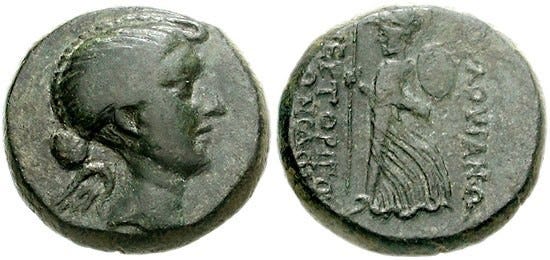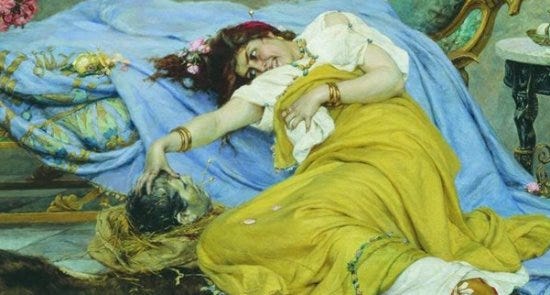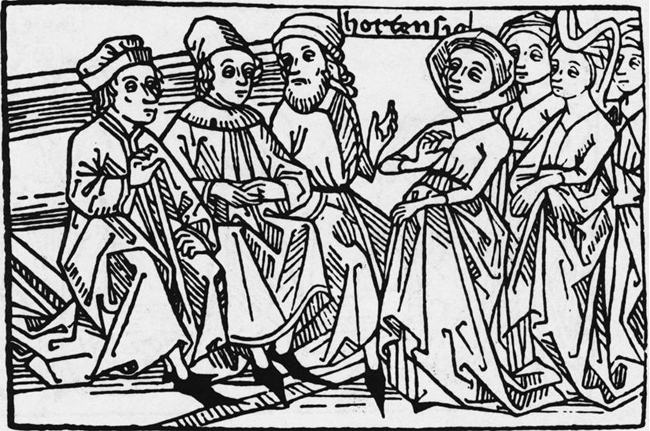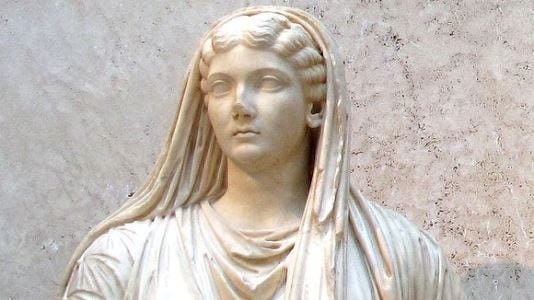Dear Classical Wisdom Reader,
It was a big social media trend last year.
We talked about it in these pages at the time, but across social media, women were asking men how often they think about the Roman Empire. Many claimed to think about it every day!
It was all a but of fun, but I think this trend ended up illustrating that there’s a tendency to view the Roman Empire exclusively in hyper-masculine terms.
Yet that wouldn’t be reflective of the truth.
So, as today is International Women’s Day, we’re looking at the lives of three significant and influential women in the life of the Roman Empire. These were women who defied convention, challenged expectations, and wielded enormous power…
Read on below to discover these remarkable historical figures, including the first non-mythological woman to appear on Roman coins, and the first empress of Rome.
Members can also mark the occasion by checking out the latest episode of Podcasts with Professors. Anya spoke to Professor Victoria Houseman about the life and legacy of Edith Hamilton, an American Classicist who helped bring interest in ancient mythology and history to a far wider public audience in the 20th century.
Members can watch that HERE!
Her life is a great example of how work like our own here at Classical Wisdom is built on the work of those who went before, which in turn is linked to those before them. We’re all part of a great conversation with our ancestors, and with those generations yet to come, regardless of our identity or background, ensuring that the stories and the lives of the ancients continue to speak to us across continents and centuries.
And so with that, I wish you all a Happy International Women’s Day!
All the best,
Sean Kelly
Managing Editor
Classical Wisdom
Women of Ancient Rome
By Nicole Saldarriaga
In ancient Rome, freeborn women were considered citizens, but they were not given the right to vote or to be involved in politics in any public way. As far as the law was concerned, women were ruled by their fathers or their husbands (and for a time–legally at least–they were essentially considered their husbands’ daughters, in terms of the legal power their husbands had over them).
As Rome evolved, however, women began to receive more and more freedoms, and as far as ancient civilizations go, Rome eventually came to be fairly progressive in this aspect. Eventually laws were passed stating that “power” over a woman was not transferred from father to husband when she married, and since fathers were often far removed or not as involved in their daughters’ lives after they married, women enjoyed a relatively large degree of freedom and autonomy in their daily lives and decisions.
It’s also true that while women were not allowed to publicly take part in politics, they were often heavily involved anyway – as advisors to their husbands. Many if not most politically active men in ancient Rome were advised in some capacity, big or small, by their wives, and eventually it even became socially acceptable for a man to publicly admit that his actions were based on advice he had taken from his wife. In this way, women had access to politics, and a few notable women became pretty heavily involved.
So, without further ado, let’s meet them.
Fulvia
Fulvia (83-40 BCE) is well known as one of the most politically active women in ancient Rome. She was born into a highly distinguished plebeian noble family and was eventually married off to a man named Publius Clodius. Clodius was an extremely well-liked populist politician, and Fulvia quickly became his right-hand woman. The two made many public appearances together, walking through the streets and gaining support from the people, and many of Clodius’ followers eventually became as loyal to Fulvia as to Clodius himself.

When Clodius was killed by a political rival, Fulvia felt no shame in grieving publicly, and she even went so far as to drag Clodius’ body through the streets of Rome, eventually inciting a riot among his followers, who carried his body to the senate and cremated him there. She then testified at the trial of Clodius’ murderer and was instrumental in getting the man exiled.
After Clodius’ death, the loyalty of his followers transferred completely to Fulvia, and the gangs Clodius had once controlled happily answered to Fulvia instead. Subsequent husbands (Gaius Scribonius Curio and Marcus Antonius) enjoyed the support of these gangs, especially after they publicly associated themselves with Clodius’ children.
Fulvia’s marriage to Marcus Antonius (or as we know him, Mark Antony) is also famous. After the assassination of Caesar, Antony was essentially the most powerful guy in town, and Fulvia fearlessly involved herself in his political life. She publicly defended Antony against the criticism of Cicero (one source even claims that after Cicero was killed for his opposition, Fulvia stabbed the corpse’s tongue with her hairpins). She also often took to the streets to rally support for Antony as she had once done for Clodius, and may have even accompanied Antony on his military campaign in Brundisium.
In 42 BCE, when Antony and Octavian left Rome in hot pursuit of Caesar’s assassins, Fulvia stayed behind and essentially held Rome in the palm of her hand. She controlled the politics, using her influence and her eloquence to gain the loyalty of several hundreds of people. In a brief visit to Rome, Octavian denounced Fulvia as power-hungry. Fearing for her little empire (and possibly, some historians claim, wanting to punish Antony for his relationship with Cleopatra), Fulvia actually raised a legion against Octavian and essentially started what is known as the Perusine War.
Eventually Fulvia’s little army surrendered to Octavian’s and she was forced to flee to Greece with her children, but there can be no doubt that Fulvia was about as fearless and ruthless as they come. Despite the status of women in her time, Fulvia was able to gain and keep the loyalty of hundreds of people. She had enough influence to control gangs, raise armies, start wars–and she was even the first (non-mythological) woman to appear on Roman coins. After the Perusine War and her reunion with Antony, she died of an unknown illness.
Hortensia
We don’t have as much information about Hortensia as we do other Roman women. She was the daughter of Quintus Hortensius, who is well known for his rhetoric and especially his rivalry with Cicero. What we do know is that it seems like Hortensia inherited a thing or two from her father, because she is most well known today for a speech she made before the Second Triumvirate.
In 42 BCE, Rome was embroiled in a war against Brutus and Cassius, Caesar’s assassins. Funding the war was ugly enough already, what with the infamous proscriptions (in which the wealthy were killed and their property confiscated), but then the Second Triumvirate announced that they would be placing a heavy tax on 1400 of Rome’s most wealthy women.
Rome’s female population was understandably outraged–they were being taxed for a war over which they had no say, no control, and no legally recognizable opinion. They weren’t even allowed to participate in politics (sound familiar, anyone? “No taxation without representation”…)
The furious women, with Hortensia at the head, marched to the forum, where Hortensia bravely stepped forward and gave an extremely eloquent speech against the tax. A Greek historian named Appian recorded her speech, and though we don’t know if he recorded it verbatim, we know through Appian that Hortensia said something along these lines:
You have already deprived us of our fathers, our sons, our husbands, and our brothers, whom you accused of having wronged you; if you take away our property also, you reduce us to a condition unbecoming our birth, our manners, our sex. Why should we pay taxes when we do not share in the offices, honors, military commands, nor in the short, the government for which you fight between yourselves with such harmful results?
The Second Triumvirate, outraged at this display, tried their best to oust the women from the forum, to no avail. They were then forced to reduce the tax, from 1400 women to 400, and make up the rest by borrowing from male citizens.
Hortensia went down in history as a skilled orator and a fearless Roman citizen, unafraid to publicly challenge what she believed was wrong.
Livia Drusilla
Livia Drusilla (58 BCE – 29 CE) was the first empress of Rome and a direct ancestor of the entire Julio-Claudian line of emperors.
Her story begins when she meets Octavian (soon-to-be Augustus). They were both married to other people at the time, and Livia was even pregnant with her second child by her first husband. The story goes that Octavian fell in love with her instantly, forced or persuaded Livia’s husband to divorce her, divorced his own wife the day she gave birth to their daughter, and essentially cleared all obstacles in the way of his having Livia for himself.
The two married quickly, waiving the typical waiting period after a divorce, and Livia’s ex-husband even gave her away “like a father” at the ceremony!
Octavian and Livia then remained together for the rest of their lives, and Livia quickly became the absolute model of a Roman wife and mother (especially after Octavian became emperor and took the title Augustus).
Though Livia was famous for her modesty, chastity, and tender care of her family, she was also a veritable lioness at Augustus’ side. Augustus trusted her greatly as a counselor and often took her political advice, and he also showered her unprecedented honors, like the ability to control her own finances. And Augustus wasn’t the only person who trusted her–she had her own little following of proteges whose political lives got started largely because of her encouragement and influence.
She also had no qualms about pushing her own sons into power, since her marriage with Augustus produced no children and he himself had only a daughter from his previous marriage. There are even rumors that Livia arranged the deaths of any other possible heirs so that Augustus would have no choice but to name her son, Tiberius, his successor.
(In fact, there are even rumors that she herself killed Augustus with poisoned figs).
None of these murders have been confirmed, but it is true that she worked hard to make sure Tiberius would sit in the emperor’s seat, and that she enjoyed as much if not more political power and control through her son as through her husband (much to Tiberius’ consternation).
Tiberius’ relationship with his mother heavily devolved during his time as emperor, and when she died, he refused to give her funeral oration. He also vetoed all honors the Senate gave her after her death and even prevented the fulfillment of her will. It wasn’t until the reign of her grandson, Claudius, that all her honors were restored. She was named Diva Augusta or Divine Augusta, her image was carried by an elephant-drawn chariot to all public games (and many races were held in her honor), a statue of her was placed in the Temple of Augustus, and women even invoked her name when making sacred oaths.
Livia essentially captured the hearts of the public, both through her image as a modest wife and mother, but also through her political involvement in the reigns of Augustus and Tiberius. She was, in effect, the Mater Patriae–the Mother of Rome.








I really enjoyed this...I am a new subscriber. Keep it up. Don't worry about being too lengthy. I understand it's a common complaint to many podcasters. If you enjoy learning as I do you appreciate depth.
Drusilla, as a name, is ranked .0001 in popularity for new baby names right now, but that could change :)